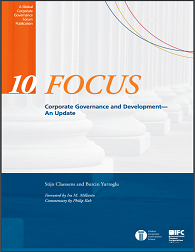 What do we know about the links between economic development and corporate governance in emerging markets? Stijn Claessens and Burcin Yurtoglu have sifted through scores of academic studies on various countries, sectors, and business organizations - from state-owned enterprises to publicly listed companies - to determine how corporate governance can influence economic development and well being, and what is needed to promote good practices.
What do we know about the links between economic development and corporate governance in emerging markets? Stijn Claessens and Burcin Yurtoglu have sifted through scores of academic studies on various countries, sectors, and business organizations - from state-owned enterprises to publicly listed companies - to determine how corporate governance can influence economic development and well being, and what is needed to promote good practices.
The Focus 10 draws on new evidence that has become available since Focus 1: Corporate Governance and Development was published in 2003. While the paper reviews research literature, it is written to be accessible to the nonacademic audience: board members, investors, government regulators, development professionals, and other CG practitioners.
Research findings sited in the Focus include:
Improved corporate governance practices increase firm share prices; hence, better-governed firms appear to enjoy a lower cost of capital.
Operational performance is higher in better corporate governance countries, although the evidence is less strong.
Well governed companies have less volatile stock prices in times of crisis.
Companies with boards composed of a higher fraction of outsider or independent directors usually have a higher market valuation.
Improvements in corporate governance quality lead to higher GDP growth, productivity growth, and the increased ratio of investment to GDP. The effect is particularly pronounced for industries that are most dependent on external finance.
When a country’s overall corporate governance and property rights systems are weak, voluntary and market corporate governance mechanisms have limited effectiveness. Proper regulatory framework and enforcement mechanisms are crucial to promote good CG practices.
Large, more concentrated ownership can be beneficial, unless there is a disparity of control and cash flow rights.
The quality of shareholder protection positively correlates with the development of countries’ capital markets.
Better corporate governance leads to a better developed financial system, which, in turn, is associated with greater access to financial services for small and medium enterprises and poorer people.
The paper concludes by identifying several main policy and research issues that require further study. For example, more research is needed on family-owned, state-owned or controlled firms that predominate in many sectors and economies.
Please send your questions or comments for the authors to Alexey Volynets at avolynets@ifc.org, and we will include them in an upcoming live Q&E session with the authors, to be announced shortly.
For more information on the topic, visit Emerging Markets Corporate Governance Research Network and Focus publication series.
Authors:
Stijn Claessens is assistant director in the research department of the International Monetary Fund, where he heads the Macro-Financial Unit. He is a professor of international finance policy at the University of Amsterdam, and chair of the Emerging Markets Corporate Governance Research Network.
Burcin Yurtoglu is a professor of corporate finance at the WHU-Otto Beisheim School of Management in Vallendar, Germany.